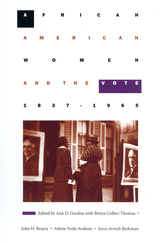
The contributors focus on specific examples of women pursuing a dual ambition: to gain full civil and political rights and to improve the social conditions of African Americans. Together, the essays challenge us to rethink common generalizations that govern much of our historical thinking about the experience of African American women.
Contributors include Bettina Aptheker, Elsa Barkley Brown, Willi Coleman, Gerald R. Gill, Ann D. Gordon, Evelyn Brooks Higginbotham, Cynthia Neverdon-Morton, Martha Prescod Norman, Janice Sumler-Edmond, Rosalyn Terborg-Penn, and Bettye Collier-Thomas.
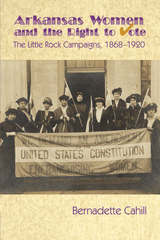

In 1842, Black Rhode Islanders secured a stunning victory, a success rarely seen in antebellum America: they won the right to vote. Amid heightened public discourse around shifting ideas of race, citizenship, and political rights, they methodically deconstructed the arguments against their enfranchisement, exposing the arbitrariness of the color line in delineating citizenship rights and choosing the perfect moments in which to act forcefully. At the head of this movement, a cohort of prominent business and community members formed an early example of a Black leadership class in the US.
CJ Martin draws upon a wealth of sources—including personal correspondences, government and organizational documents, tax records, and petitions—to argue that Black leaders employed a unique combination of agitation and accommodation to ensure the success of the movement. By investigating their tactics, Martin deepens the story of how race played a crucial role in American citizenship, and by focusing on Black leadership, he relates this history through the people who lived it—who thought, debated, petitioned, and enacted their own liberation. Telling the story of a fight that was as important to the pioneers of interracial democracy as it was for the civil rights activists of the twentieth century, The Precious Birthright provides new insight into the larger story of Black freedom.
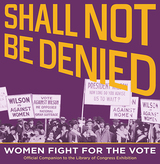
Official Companion to the Library of Congress Exhibition.
The campaign for women’s suffrage—considered the largest reform movement in American history—lasted more than seven decades. The struggle was not for the fainthearted. For years, determined women organized, lobbied, paraded, petitioned, lectured, picketed, and faced imprisonment in pursuit of the right to vote. Drawing from the Library’s extensive collections of photographs, personal papers, and the organizational records of such figures as Susan B. Anthony, Elizabeth Cady Stanton, Mary Church Terrell, Carrie Chapman Catt, the National Woman’s Party, and the National American Woman Suffrage Association, Shall Not Be Denied traces the movement leading to the women’s rights convention at Seneca Falls, the contributions of suffragists who worked to persuade women that they deserved the same rights as men, the divergent political strategies and internal divisions they overcame, the push for a federal women’s suffrage amendment, and the legacy of the movement.
A companion to the exhibition staged by the Library of Congress, which opened on June 4, 2019—the 100th anniversary of the US Senate’s passage of the suffrage amendment that would become the 19th amendment—Shall Not Be Denied: Women Fight for the Vote is part of the national commemoration of the 100th anniversary of women’s suffrage.
Published by Rutgers University Press in association with the Library of Congress.
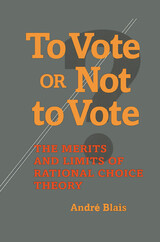
What makes people decide to vote? In addressing this simple question, André Blais examines the factors that increase or decrease turnout at the aggregate, cross-national level and considers what affects people’s decision to vote or to abstain. In doing so, Blais assesses the merits and limitations of the rational choice model in explaining voter behavior. The past few decades have witnessed a rise in the popularity of the rational choice model in accounting for voter turnout, and more recently a groundswell of outspoken opposition to rational choice theory.
Blais tackles this controversial subject in an engaging and personal way, bringing together the opposing theories and literatures, and offering convincing tests of these different viewpoints. Most important, he handles the discussion in a clear and balanced manner. Using new data sets from many countries, Blais concludes that while rational choice is an important tool—even when it doesn’t work—its empirical contribution to understanding why people vote is quite limited.
Whether one supports rational choice theory or opposes it, Blais’s evenhanded and timely analysis will certainly be of interest, and is well-suited for advanced undergraduate and graduate-level classes.
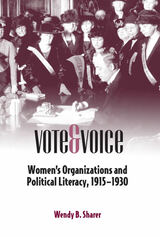
Vote and Voice is the first book-length study to address the writing and speaking practices of members of women’s political organizations in the decade after the suffrage movement. During those years, women still did not have power within deliberative and administrative organs of politics, despite their recent enfranchisement. Because they were largely absent from diplomatic circles and political parties, post-suffrage women’s organizations developed rhetorical practices of public discourse to push for reform within traditional politics.
Vote and Voice is historically significant as well as pedagogically beneficial for instructors who connect rhetorical education with public participation by integrating writing and speaking skills into a curriculum that aims to prepare educated students and active citizens.
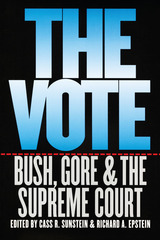
The contributors to this volume were highly visible in the national media while the controversy raged, and here they present fully fleshed-out arguments for the positions they promoted on the airwaves. Readers will find in The Vote equally impassioned defenses for and indictments of the Court's actions, and they will come to understand the practical and theoretical implications of the Court's ruling in the realms of both law and politics. No doubt a spate of books will appear on the 2000 presidential election, but none will claim as distinguished a roster of contributors better qualified to place these recent events in their appropriate historical, legal, and political contexts.
Leading constitutional scholars render their verdicts on the 2000 presidential election controversy
Contributors:
Richard A. Epstein
Elizabeth Garrett
Samuel Issacharoff
Pamela S. Karlan
Michael W. McConnell
Frank I. Michelman
Richard H. Pildes
Richard A. Posner
David A. Strauss
Cass R. Sunstein
John Yoo
An earlier electronic edition of The Vote was available on the University of Chicago Press Web site.
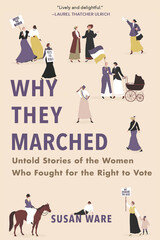
“Lively and delightful…zooms in on the faces in the crowd to help us understand both the depth and the diversity of the women’s suffrage movement. Some women went to jail. Others climbed mountains. Visual artists, dancers, and journalists all played a part…Far from perfect, they used their own abilities, defects, and opportunities to build a movement that still resonates today.”
—Laurel Thatcher Ulrich, author of Well-Behaved Women Seldom Make History
“An intimate account of the unheralded activism that won women the right to vote, and an opportunity to celebrate a truly diverse cohort of first-wave feminist changemakers.”
—Ms.
“Demonstrates the steady advance of women’s suffrage while also complicating the standard portrait of it.”
—New Yorker
The story of how American women won the right to vote is usually told through the lives of a few iconic leaders. But movements for social change are rarely so tidy or top-heavy. Why They Marched profiles nineteen women—some famous, many unknown—who worked tirelessly out of the spotlight protesting, petitioning, and insisting on their right to full citizenship.
Ware shows how women who never thought they would participate in politics took actions that were risky, sometimes quirky, and often joyous to fight for a cause that mobilized three generations of activists.
The dramatic experiences of these pioneering feminists—including an African American journalist, a mountain-climbing physician, a southern novelist, a polygamous Mormon wife, and two sisters on opposite sides of the suffrage divide—resonate powerfully today, as a new generation of women demands to be heard.
READERS
Browse our collection.
PUBLISHERS
See BiblioVault's publisher services.
STUDENT SERVICES
Files for college accessibility offices.
UChicago Accessibility Resources
home | accessibility | search | about | contact us
BiblioVault ® 2001 - 2024
The University of Chicago Press









